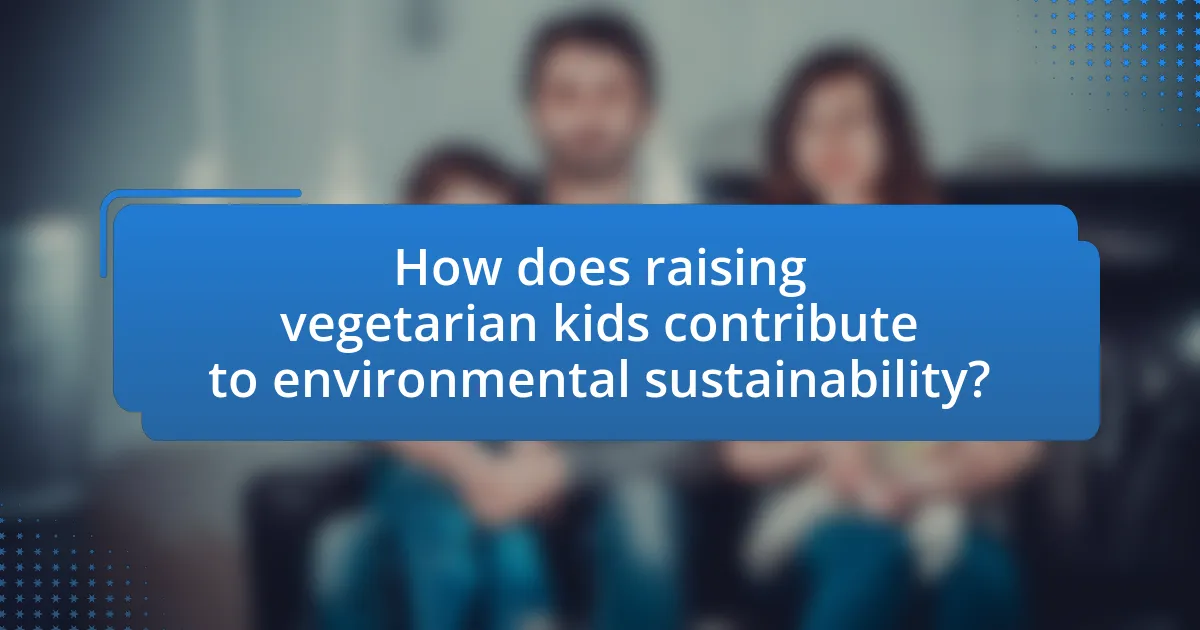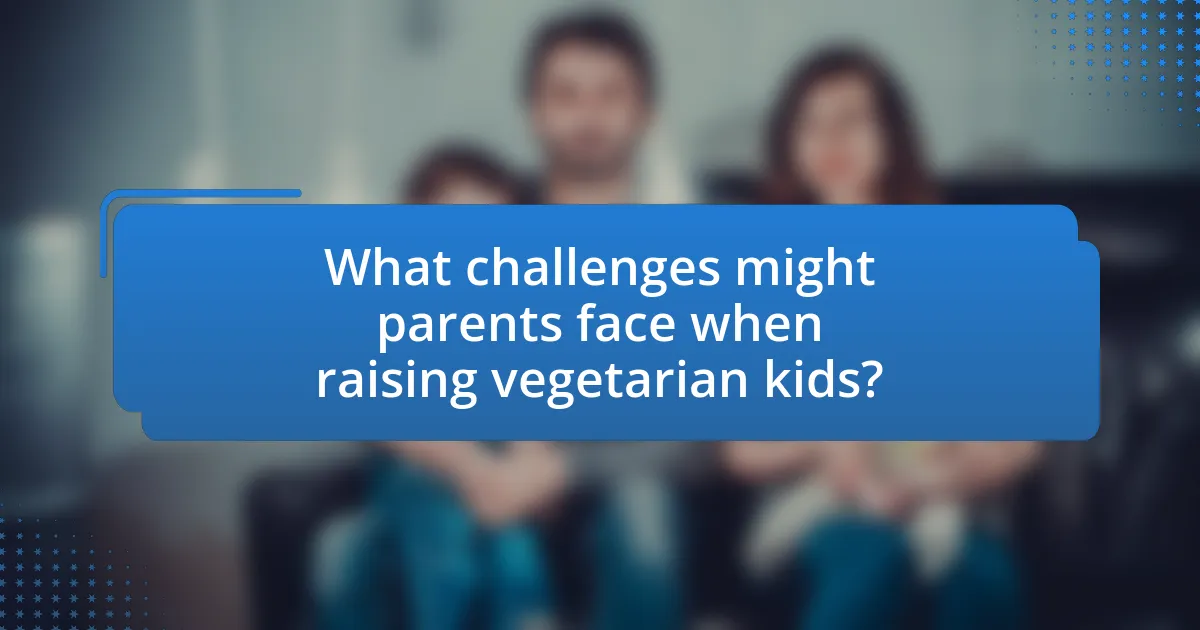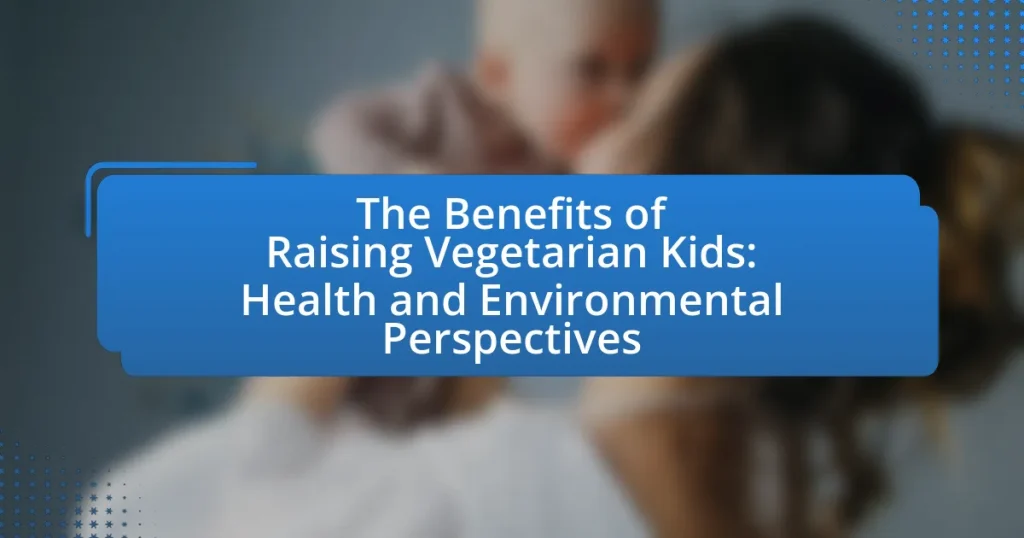The article examines the benefits of raising vegetarian children, highlighting both health and environmental perspectives. It outlines how vegetarian diets can lead to improved health outcomes, such as lower risks of obesity and chronic diseases, while also providing essential nutrients necessary for growth and development. Additionally, the article discusses the positive environmental impact of vegetarianism, including reduced greenhouse gas emissions and conservation of water resources. It addresses the psychological benefits of fostering empathy and social responsibility in children, as well as the challenges parents may face in ensuring balanced nutrition and navigating social situations. Overall, the article emphasizes the multifaceted advantages of adopting a vegetarian lifestyle for children.

What are the benefits of raising vegetarian kids?
Raising vegetarian kids offers numerous benefits, including improved health outcomes and a positive environmental impact. Studies indicate that vegetarian diets are associated with lower risks of obesity, heart disease, and type 2 diabetes in children, as they tend to be higher in fruits, vegetables, and whole grains, which provide essential nutrients and fiber. Additionally, a vegetarian lifestyle can foster a greater awareness of food sources and promote ethical considerations regarding animal welfare. Environmentally, vegetarian diets contribute to reduced greenhouse gas emissions and lower resource consumption, as livestock farming is a significant contributor to climate change. Research from the World Resources Institute highlights that shifting towards plant-based diets can significantly decrease the ecological footprint of food production.
How does a vegetarian diet impact children’s health?
A vegetarian diet can positively impact children’s health by providing essential nutrients while reducing the risk of chronic diseases. Research indicates that children on vegetarian diets often have lower body mass indexes (BMIs) and a reduced risk of obesity, type 2 diabetes, and heart disease. A study published in the Journal of the American Dietetic Association found that vegetarian children typically consume more fruits, vegetables, and whole grains, which are linked to better overall health outcomes. Additionally, vegetarian diets can promote healthy eating habits and improve nutrient intake, including fiber, vitamins, and antioxidants, which are crucial for growth and development.
What essential nutrients are found in a vegetarian diet for kids?
A vegetarian diet for kids contains essential nutrients such as protein, iron, calcium, vitamin B12, vitamin D, omega-3 fatty acids, and zinc. Protein is crucial for growth and development and can be obtained from legumes, nuts, and dairy products. Iron, important for oxygen transport in the blood, is found in lentils, chickpeas, and fortified cereals. Calcium supports bone health and can be sourced from dairy products and fortified plant milks. Vitamin B12, necessary for nerve function and blood cell production, is primarily found in animal products, so fortified foods or supplements are often needed. Vitamin D aids in calcium absorption and can be obtained from fortified foods or sunlight exposure. Omega-3 fatty acids, important for brain health, can be sourced from flaxseeds, chia seeds, and walnuts. Lastly, zinc supports immune function and can be found in beans, nuts, and whole grains.
How can a vegetarian diet prevent childhood obesity?
A vegetarian diet can prevent childhood obesity by promoting lower calorie intake and higher consumption of nutrient-dense foods. Research indicates that vegetarian diets are typically rich in fruits, vegetables, whole grains, and legumes, which are lower in calories and high in fiber, helping children feel full while consuming fewer calories. A study published in the Journal of the American Dietetic Association found that children following vegetarian diets had lower body mass indexes (BMIs) compared to their non-vegetarian peers, highlighting the effectiveness of plant-based diets in managing weight. Additionally, the emphasis on whole foods in vegetarian diets reduces the likelihood of consuming processed foods high in sugars and unhealthy fats, further contributing to weight management and obesity prevention in children.
What are the psychological benefits of raising vegetarian children?
Raising vegetarian children can lead to several psychological benefits, including enhanced empathy, improved self-esteem, and increased awareness of health and environmental issues. Children who adopt a vegetarian lifestyle often develop a greater sense of compassion towards animals, which can foster empathy and emotional intelligence. Research indicates that children who are taught to consider the ethical implications of their food choices tend to exhibit higher levels of altruism and social responsibility. Additionally, vegetarian diets are often associated with healthier eating habits, which can contribute to improved self-esteem and body image among children. Studies show that children who feel good about their dietary choices are more likely to have positive self-perceptions. Furthermore, raising vegetarian children can instill a sense of responsibility and awareness regarding environmental sustainability, as they learn about the impact of food production on the planet. This awareness can lead to a more conscientious worldview, promoting psychological resilience and a proactive approach to global issues.
How does a vegetarian lifestyle influence children’s attitudes towards food?
A vegetarian lifestyle positively influences children’s attitudes towards food by fostering an appreciation for plant-based foods and promoting healthier eating habits. Research indicates that children raised in vegetarian households are more likely to consume a variety of fruits, vegetables, and whole grains, which can lead to a more balanced diet. A study published in the journal “Appetite” found that children who follow vegetarian diets often develop a greater awareness of food sources and nutritional content, enhancing their overall food literacy. This awareness can lead to more mindful eating practices and a preference for healthier food choices throughout their lives.
What role does empathy play in vegetarianism among kids?
Empathy significantly influences vegetarianism among kids by fostering a connection to animals and the environment. When children develop empathy, they are more likely to understand the suffering of animals raised for food, which can lead to a preference for vegetarian diets. Research indicates that children as young as three can express concern for animals, and this emotional response can shape their dietary choices. For instance, a study published in the journal “Appetite” found that children who exhibit higher levels of empathy are more inclined to adopt vegetarianism, as they relate to the well-being of animals and the impact of meat consumption on the environment.

How does raising vegetarian kids contribute to environmental sustainability?
Raising vegetarian kids contributes to environmental sustainability by significantly reducing their carbon footprint and resource consumption. The livestock industry is responsible for approximately 14.5% of global greenhouse gas emissions, primarily methane and nitrous oxide, which are far more potent than carbon dioxide. By choosing a vegetarian diet, children help decrease the demand for meat production, which in turn lowers deforestation rates, water usage, and land degradation associated with animal farming. For instance, producing one kilogram of beef requires about 15,000 liters of water, while plant-based foods generally require far less water. Therefore, raising vegetarian kids not only promotes their health but also plays a crucial role in fostering a more sustainable environment.
What are the environmental impacts of meat consumption?
Meat consumption significantly contributes to environmental degradation through greenhouse gas emissions, deforestation, and water usage. Livestock production accounts for approximately 14.5% of global greenhouse gas emissions, primarily methane and nitrous oxide, which are far more potent than carbon dioxide. Additionally, raising animals for food requires vast amounts of land; for instance, the Food and Agriculture Organization estimates that livestock production is responsible for 70% of deforestation in the Amazon rainforest. Furthermore, meat production is water-intensive, with estimates suggesting that producing one kilogram of beef requires around 15,000 liters of water, highlighting the strain on freshwater resources. These factors collectively illustrate the substantial environmental impacts associated with meat consumption.
How does reducing meat intake lower carbon footprints?
Reducing meat intake lowers carbon footprints by decreasing greenhouse gas emissions associated with livestock production. Livestock farming is responsible for approximately 14.5% of global greenhouse gas emissions, primarily methane and nitrous oxide, which are significantly more potent than carbon dioxide. By consuming less meat, individuals contribute to a reduction in the demand for livestock farming, thereby lessening the environmental impact linked to land use, feed production, and waste management. Studies indicate that a shift towards plant-based diets can reduce an individual’s carbon footprint by up to 50%, highlighting the substantial environmental benefits of lowering meat consumption.
What are the water conservation benefits of a vegetarian diet?
A vegetarian diet significantly conserves water by reducing the water footprint associated with food production. Producing plant-based foods generally requires less water compared to raising livestock; for instance, it takes approximately 1,800 gallons of water to produce one pound of beef, while only about 200 gallons are needed for a pound of vegetables. This stark difference highlights that adopting a vegetarian diet can lead to substantial water savings, contributing to more sustainable water use in agriculture.
How can vegetarianism promote biodiversity?
Vegetarianism can promote biodiversity by reducing the demand for livestock farming, which is a major driver of habitat destruction and species extinction. Livestock production requires significant land, water, and feed resources, leading to deforestation and loss of natural habitats. For instance, the Food and Agriculture Organization (FAO) reports that livestock farming is responsible for approximately 70% of deforestation in the Amazon rainforest. By adopting a vegetarian diet, individuals contribute to lower greenhouse gas emissions and decreased pressure on ecosystems, allowing for the preservation of diverse plant and animal species. This dietary shift supports sustainable agricultural practices that prioritize crop diversity and ecosystem health, further enhancing biodiversity.
What is the relationship between livestock farming and habitat destruction?
Livestock farming is a significant driver of habitat destruction, primarily due to the conversion of forests and grasslands into grazing land and feed crop production. This agricultural practice contributes to deforestation, with the Food and Agriculture Organization estimating that livestock farming is responsible for approximately 70% of deforestation in the Amazon rainforest. Additionally, habitat loss leads to biodiversity decline, as ecosystems are disrupted and species are displaced or driven to extinction. The relationship between livestock farming and habitat destruction is thus characterized by the direct impact of land use changes on natural environments, supported by data indicating that extensive livestock production is a major factor in global habitat degradation.
How does a vegetarian diet support sustainable agriculture practices?
A vegetarian diet supports sustainable agriculture practices by reducing the demand for resource-intensive animal farming. Livestock production requires significantly more land, water, and energy compared to plant-based food production; for instance, producing one kilogram of beef requires approximately 15,000 liters of water, while producing one kilogram of vegetables requires only about 300 liters. This shift towards plant-based diets can lead to decreased greenhouse gas emissions, as animal agriculture is responsible for about 14.5% of global emissions. Additionally, a vegetarian diet promotes biodiversity by encouraging the cultivation of a wider variety of crops, which can enhance soil health and ecosystem resilience.

What challenges might parents face when raising vegetarian kids?
Parents raising vegetarian kids may face challenges such as ensuring balanced nutrition, managing social situations, and addressing misconceptions about vegetarian diets. Ensuring balanced nutrition is crucial, as parents must provide adequate protein, iron, calcium, and vitamins B12 and D, which are often found in animal products. Social situations can be difficult, as children may encounter peer pressure or limited food options at school or social gatherings, leading to feelings of exclusion. Additionally, misconceptions about vegetarian diets can arise, with others questioning the healthfulness or adequacy of a vegetarian lifestyle, which may create stress for both parents and children. These challenges require proactive planning and education to navigate effectively.
How can parents ensure their vegetarian children receive balanced nutrition?
Parents can ensure their vegetarian children receive balanced nutrition by incorporating a variety of plant-based foods that provide essential nutrients. This includes ensuring adequate intake of proteins from legumes, nuts, and seeds, as well as iron from leafy greens and fortified cereals. Additionally, parents should include sources of vitamin B12, such as fortified plant milks or nutritional yeast, and omega-3 fatty acids from flaxseeds or chia seeds. Research indicates that a well-planned vegetarian diet can meet the nutritional needs of children, as long as it includes diverse food groups to cover all essential vitamins and minerals.
What are common nutritional deficiencies in vegetarian diets for kids?
Common nutritional deficiencies in vegetarian diets for kids include protein, iron, vitamin B12, calcium, and omega-3 fatty acids. These nutrients are often less abundant in plant-based foods, making it essential for caregivers to ensure adequate intake through careful meal planning. For instance, protein can be sourced from legumes, nuts, and whole grains, while iron absorption can be enhanced by pairing plant sources with vitamin C-rich foods. Vitamin B12, primarily found in animal products, may require supplementation or fortified foods for vegetarian children. Calcium can be obtained from fortified plant milks and leafy greens, and omega-3 fatty acids can be sourced from flaxseeds and chia seeds. Addressing these deficiencies is crucial for supporting the growth and development of vegetarian children.
How can parents address picky eating habits in vegetarian children?
Parents can address picky eating habits in vegetarian children by introducing a variety of plant-based foods and involving children in meal preparation. Research indicates that children are more likely to try new foods when they participate in cooking, as it fosters a sense of ownership and curiosity about their meals. Additionally, offering a diverse range of textures and flavors can help expand their palate; for instance, incorporating legumes, whole grains, fruits, and vegetables in creative ways can make meals more appealing. A study published in the journal “Appetite” found that repeated exposure to new foods increases acceptance, suggesting that persistence and patience are key strategies for parents.
What social challenges do vegetarian kids encounter?
Vegetarian kids encounter social challenges such as peer pressure, social isolation, and limited food options during social gatherings. Peer pressure can lead to feelings of exclusion when vegetarian children are unable to partake in meat-centric meals, which are often the norm in many social settings. Social isolation may arise from being different in dietary choices, making it harder for them to connect with peers who do not understand or respect their lifestyle. Additionally, limited food options at parties or events can create awkward situations, as many common snacks and meals may not align with their vegetarian diet. These challenges can affect their social interactions and overall well-being.
How can parents help their children navigate social situations involving food?
Parents can help their children navigate social situations involving food by encouraging open communication about dietary preferences and providing them with coping strategies. Teaching children to express their vegetarian choices confidently can reduce anxiety in social settings, as studies show that children who feel supported in their dietary choices are more likely to engage positively with peers. Additionally, parents can role-play various scenarios, such as attending parties or dining out, to prepare children for potential questions or challenges they may face regarding their food choices. This preparation fosters resilience and helps children feel more comfortable in diverse eating environments.
What strategies can parents use to educate others about vegetarianism?
Parents can educate others about vegetarianism by organizing community workshops and sharing informative resources. These workshops can include cooking demonstrations, nutritional information, and discussions on the environmental benefits of a vegetarian diet. Research indicates that educational programs can significantly increase awareness and understanding of dietary choices, as seen in studies conducted by the American Dietetic Association, which highlight the positive impact of community engagement on dietary habits. Additionally, parents can utilize social media platforms to share personal experiences, recipes, and articles that emphasize the health benefits and ethical considerations of vegetarianism, further fostering a supportive community dialogue.
What practical tips can parents follow to raise vegetarian kids successfully?
To raise vegetarian kids successfully, parents should introduce a variety of plant-based foods early on, ensuring that meals are balanced and nutritious. This includes incorporating fruits, vegetables, whole grains, legumes, nuts, and seeds into daily diets to provide essential nutrients like protein, iron, and calcium. Research indicates that children who consume a well-planned vegetarian diet can meet their nutritional needs and maintain healthy growth (American Dietetic Association, 2009). Additionally, involving children in meal planning and preparation can foster a positive attitude towards vegetarianism, making them more likely to embrace these dietary choices.


